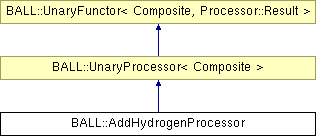Main Page | Modules | Namespace List | Class Hierarchy | Class List | Namespace Members | Class Members
AddHydrogenProcessor Class Reference
[Miscellaneous]
Saturate atoms with hydrogen atoms.
More...
#include <addHydrogenProcessor.h>
Inheritance diagram for AddHydrogenProcessor:

Public Member Functions | |
| AddHydrogenProcessor (const AddHydrogenProcessor &hbp) | |
| virtual bool | start () |
| start method | |
| virtual Processor::Result | operator() (Composite &composite) |
| operator () | |
| Size | getConnectivity (Atom &atom) |
| void | setRings (const vector< vector< Atom * > > &rings) |
| Size | getNumberOfAddedHydrogens () |
Protected Member Functions | |
| Size | countBondOrders (Atom &atom) |
| void | addHydrogen_ (Atom &atom, Vector3 position) |
| bool | isRingAtom_ (Atom &atom) |
| vector< Atom * > | getPartners_ (Atom &atom) |
| Vector3 | getNormal_ (const Vector3 &v) |
| bool | normalize_ (Vector3 &v) |
| bool | hasMultipleBond_ (Atom &atom) |
| float | getBondLength_ (Position element) |
Protected Attributes | |
| HashSet< Atom * > | ring_atoms_ |
| Position | atom_nr_ |
| Atom * | last_atom_ |
| Size | nr_hydrogens_ |
Detailed Description
Saturate atoms with hydrogen atoms.
Only works with main group elements. The formal charge of the atoms are taken into account. The placement of the hydrogen atoms only depends on the direct neighbour atoms. No additional optimization of the atom placement is done. The optimal bond lengths are calculized by a modified Schomaker-Stevenson rule (adapted from the MMFF94 force field).
Usage:
RingPerceptionProcessor rpp;
vector<vector<Atom*> > rings;
rpp.calculateSSSR(rings, system);
rings = rpp.getAllSmallRings();
AddHydrogenProcessor ap;
ap.setRings(rings);
system.apply(ap);